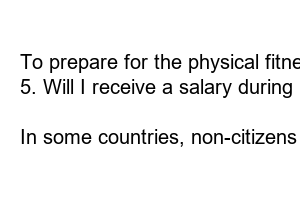경찰이 되는 방법
Title: How to Become a Police Officer: A Comprehensive Guide
Introduction:
Joining the police force is a noble and rewarding career choice for those seeking to serve and protect their community. But how does one become a police officer? In this blog post, we will provide a step-by-step guide to help you navigate the path towards achieving your dream of being a law enforcement officer.
1. Meet the Basic Requirements:
To become a police officer, you must meet certain criteria. These generally include being at least 18 years old, having a high school diploma or GED, and being a citizen or legal resident of the country you wish to serve.
2. Pursue Higher Education:
While a college degree is not always required, it can enhance your chances of becoming a police officer and open doors to advanced positions. Consider enrolling in criminal justice, law enforcement, or related fields to gain specialized knowledge and skills that will set you apart.
3. Physical Fitness and Training:
Physical fitness is crucial in law enforcement. *Maintaining a healthy lifestyle and engaging in regular exercise* will not only prepare you for the physical demands of the job but also demonstrate your commitment and dedication to potential employers.
4. Complete Police Academy Training:
Upon selection, aspiring police officers undergo rigorous training at a police academy. Subjects covered may include constitutional law, firearms proficiency, investigative techniques, and more. Be prepared for a combination of classroom instruction, practical exercises, and hands-on experience.
5. Pass Background Checks and Examinations:
To ensure suitability for a law enforcement career, candidates must pass thorough background checks, including criminal record and personal history investigations. Additionally, expect to undergo written and physical examinations to evaluate your aptitude and abilities.
6. Apply and Interview:
Once you have met the requirements and completed the necessary training, it’s time to apply and participate in an interview with the hiring agency. *Highlight your qualifications, articulate your reasons for wanting to become a police officer, and showcase your commitment to serving the community*.
7. Field Training and Probation:
If selected, you will typically embark on a period of field training, where you will work alongside experienced officers to apply what you’ve learned. This phase is designed to provide practical experience and ensure you are ready to handle the responsibilities of a police officer. After successfully completing this stage, you will typically serve a probationary period before being fully confirmed as a police officer.
Summary:
Becoming a police officer requires dedication, preparation, and a strong commitment to public service. By meeting the basic requirements, pursuing education, maintaining physical fitness, completing academy training, passing examinations and background checks, and successfully navigating the application and interview process, you can position yourself for a fulfilling career in law enforcement. Remember, each step is a crucial part of the journey towards making a difference in your community.
FAQs:
1. Can I become a police officer if I have a criminal record?
While having a criminal record may impact your chances of becoming a police officer, it does not automatically disqualify you. Factors such as the type of offense, its recency, and your overall demonstrated character and rehabilitation will be considered during the background check.
2. Is a college degree necessary to become a police officer?
While not always mandatory, having a college degree can enhance your prospects and open doors to advancement within the law enforcement field.
3. Are there age requirements to become a police officer?
Most police departments have a minimum age requirement of 18 or 21 years. However, some agencies may have upper age limits, so it’s important to check the specific requirements of your desired jurisdiction.
4. What can I do to prepare for the physical fitness test?
To prepare for the physical fitness test, focus on cardiovascular exercises, strength training, and agility drills. Consulting with a fitness professional or engaging in a pre-training program can also be beneficial.
5. Will I receive a salary during police academy training?
Yes, most police departments offer a salary or stipend to recruits during their academy training.
6. Can I become a police officer if I am not a citizen?
In some countries, non-citizens may be eligible to become police officers, provided they have permanent residency or meet specific criteria. However, the requirements may vary, so it’s important to check with the relevant authorities in your jurisdiction.

